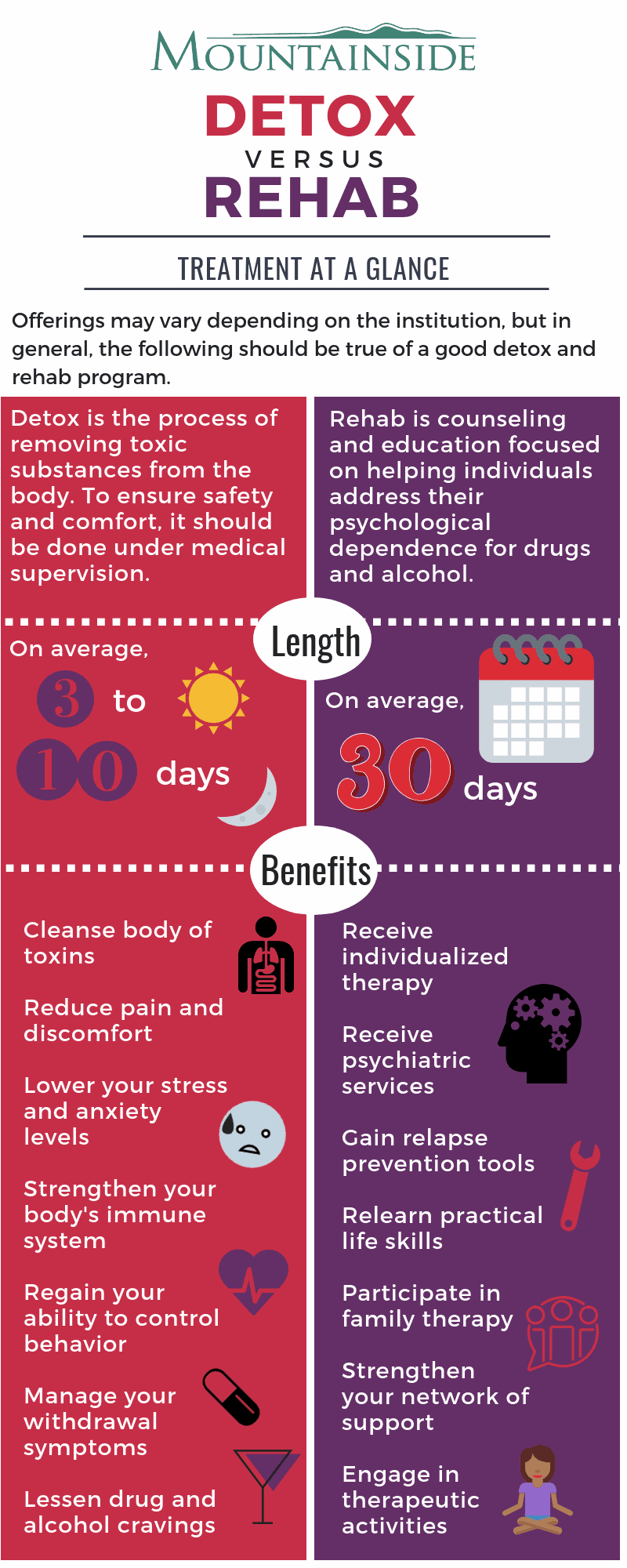If you’re in the grips of addiction and want to make a change, you may ask yourself, “Should I go to detox or rehab?” Embarking on substance abuse recovery can be challenging, with many paths to consider. Two of the most crucial components of drug and alcohol treatment are detox and rehab. While these terms are often used interchangeably, they represent distinct processes with unique purposes. Understanding the differences between detox and rehab is essential in determining the most appropriate course of action for your specific needs.
Detox and Rehab: Choosing the Right Path
When it comes to programs for recovering addicts, the choice between detox and rehab is not a matter of “either/or.” In fact, the most effective approach typically involves a combination of both.
Detox is the essential first step in drug and alcohol intervention programs and the recovery process, as it allows the body to rid itself of the harmful substances that have accumulated due to addiction. Detox can manage active addiction in the short term, but detox alone is often not sufficient for long-term recovery. Once a person has had a substance abuse evaluation, individuals should then engage in the comprehensive rehabilitation process to address the psychological, emotional, and behavioral aspects of their addiction.
It is important to note that every person’s recovery journey is different; however, with support and the proper medical care, detox and rehab are important first steps to embrace a life of long-term recovery.
The decision to pursue detox, rehab, or both should be made in consultation with a healthcare professional trained in drug and alcohol therapy who can assess specific needs and recommend the most appropriate course of action. Factors such as the substance of abuse, the severity of addiction, and the presence of the possible need for mental health and substance abuse treatment all play a role in determining the most effective treatment plan.
The Detox Process: A Closer Look
What is the difference between detox and rehab? Let’s look at detox first:
During the detox phase, individuals may experience a range of withdrawal symptoms, including:
- Nausea and vomiting
- Tremors and shaking
- Anxiety and irritability
- Insomnia
- Seizures (in the case of certain substances, such as alcohol and benzodiazepines)
To ensure safety and comfort, medically supervised detox programs with taper drugs are strongly recommended. These programs provide round-the-clock monitoring by medical professionals, as well as the administration of medications to alleviate the severity of withdrawal symptoms.
The length of the detox process can vary, but it is short-term drug rehabilitation, typically ranging from 3 to 10 days, depending on the substance abused and the severity of the addiction. Once the body has been stabilized and the individual has successfully navigated the initial withdrawal phase, they are then ready to transition into the rehabilitation phase of their recovery journey.
The Rehabilitation Process: A Comprehensive Approach
While detox addresses the physical aspects of addiction, rehabilitation (rehab) focuses on the psychological, emotional, and behavioral components of substance abuse. Rehab programs offer a range of evidence-based therapies and interventions designed to help individuals develop the necessary skills and strategies to maintain long-term sobriety.
One of the key benefits of inpatient treatment is the opportunity for individuals to participate in a structured and supportive environment, free from the triggers and temptations of their everyday lives. This type of drug and alcohol addiction rehabilitation allows clients to focus solely on their recovery and engage in the intensive work required to address the underlying causes of their addiction.
Rehab programs typically include the following components:
- Cognitive behavioral therapy (CBT): CBT helps individuals identify and modify the thought patterns and behaviors that contribute to their addiction, enabling them to develop more adaptive coping mechanisms.
- Family therapy: Addiction can have a significant impact on an individual’s relationships, and family therapy helps repair and rebuild these important connections.
- Group counseling: Participating in group therapy sessions allows individuals to share their experiences, learn from one another, and build a supportive network of peers in recovery.
- Holistic wellness practices: Many rehab programs incorporate wellness activities such as yoga, meditation, and nutrition education to promote overall wellbeing and healthy lifestyle habits.
The length of a rehab program can vary, but most experts recommend a minimum of 30 days, with longer stays (up to 120 days) associated with better long-term outcomes. During this time, individuals have the opportunity to develop a comprehensive understanding of their addiction, learn relapse prevention strategies, and establish a strong foundation for a life in recovery.
Many treatment centers also offer online help for addiction, intensive outpatient treatment (IOP), and other outpatient programs. While it’s generally recommended that clients attend an inpatient rehabilitation program for 30 days or more, sometimes that’s simply not possible due to family or employment concerns. In these cases, intensive outpatient treatment can be a viable option for a person freshly out of detox who still desires to maintain and cultivate their recovery.
Detox and Rehab: A Holistic Approach to Recovery
Addiction is a complex and multifaceted condition that requires a comprehensive approach to treatment. While detox and rehab are distinct processes, they work together to address the physical, psychological, and behavioral aspects of substance abuse.
Detox lays the foundation, while rehab focuses on the “why” – the underlying aspects of addiction. Through a range of evidence-based therapies and interventions, individuals have the opportunity to address the underlying causes of their substance abuse, develop relapse prevention strategies, and learn how to navigate a life free from the grip of addiction.
For most, combining detox and rehab is the best choice. By doing this, individuals can address the multifaceted nature of their addiction and increase their chances of achieving long-term sobriety. This holistic approach recognizes that addiction affects the mind, body, and spirit and that true recovery requires addressing all of these aspects. Substance abuse organizations such as SMART Recovery and the 12-step programs of Narcotics Anonymous or Alcoholics Anonymous can greatly help post-treatment.
Whether it’s detox, rehab, or a combination of both, seeking professional guidance and support is crucial in navigating the path to recovery. By understanding the distinct purposes of these two essential components of addiction treatment, individuals can make informed decisions about the most appropriate course of action for their unique needs.
Detox and Rehab: At a Glance
To further illustrate the differences between detox and rehab, let’s take a closer look at the key features of each:
Detox
The process of removing toxic substances from the body, typically under medical supervision to ensure safety and comfort.
Duration: on average, 3 to 10 days
Benefits:
- Cleanse the body of toxins
- Reduce pain and discomfort
- Lower stress and anxiety levels
- Strengthen the body’s immune system
- Regain control over behavior
- Manage withdrawal symptoms
- Lessen drug and alcohol cravings
Rehab
Counseling and education focused on helping individuals stop using drugs and alcohol by addressing their psychological dependence on the substance.
Duration: on average, 30 days, with longer stays (up to 120 days) associated with better long-term outcomes.
Benefits:
- Receive individualized therapy
- Gain access to psychiatric services
- Develop relapse prevention tools
- Relearn practical life skills
- Participate in family therapy
- Strengthen their network of support
- Engage in therapeutic activities
By understanding the distinct purposes and benefits of both detox and rehab, individuals can make an informed decision about the most appropriate path forward in their recovery journey

If you or a loved one is struggling with addiction, Mountainside can help.
Click here or call (888) 833-4676 to speak with one of our addiction treatment experts.

 By
By 





